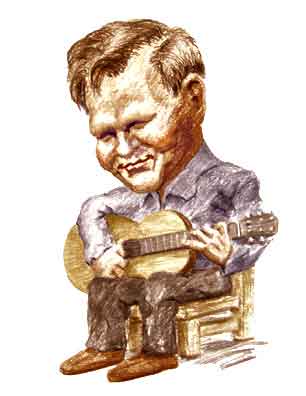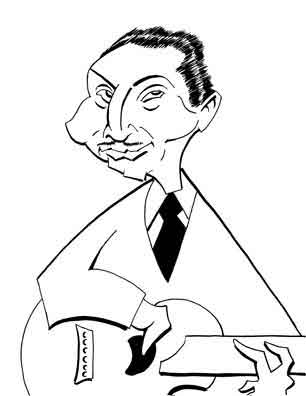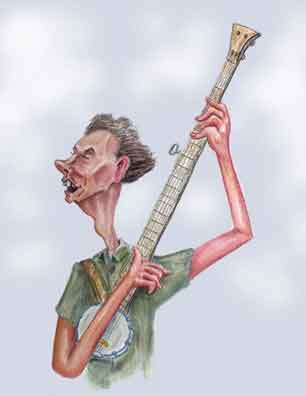Doc Watson
1923 - 2012

Doc Watson
Radical and Revolutionary
For every revolution, there has to be a revolutionary - and everyone agrees Arthel Lane "Doc" Watson was a true revolutionary. One author even used the term "radical" for Doc's style of rapid guitar flatpicking.
But for every true radical revolutionary there is always an underlying tradition. Up to the 1950's the mantle of King of the Flat Pickers had been handed to the jazz musician Django Reinhardt. With his incredible speed and clean playing with violinist Stephane Grapelli, Django was so famous and popular that the Germans had to leave him alone during occupation of Paris in the 1940's despite his gypsy heritage. But swing and jazz were never alien to Doc, and a major influence on his playing was indeed Django. Doc once even preluded a guitar break by saying he would do "a little Django".
That said, Doc is considered (and is) the founder of the modern style of bluegrass flatpicking. Originally, though, Doc came to national attention as a folk and old time musician (despite some superficial resemblances, old time and bluegrass are not the same). Even in his later years when he was adding hefty doses of bluegrass and rockabilly to his concerts, Doc said the old songs and ballads were the best. CooperToons concurs.
Doc was born on March 3, 1923 in Stoney Fork, Watauga County, North Carolina. He had a congenital eye defect which restricted blood flow to the eyes. Then when he was one year old an eye infection produced blindness although Doc retained some light perception well into adulthood.
Doc's handicap naturally made him perceptive to music. His mother, Annie, would sing songs and take him to church where he would listen to the choir and the congregation sing hymns. He learned to play harmonica well enough that his dad, General Dixon Watson (a given name, not a military rank), would buy him a new one each year. Doc's dad recognized his son's talent and built him a five string fretless banjo with a groundhog head. He showed his son how to play "Rambling Hobo" and Doc then learned to play other songs by ear.
We don't know much about Doc's dad, but he comes off as a rather reserved man who nonetheless recognized and encouraged his son's ability. But what Doc most gave him credit for was showing him that being blind didn't mean you weren't useful. In more than one interview Doc remembered the best thing his dad did for him was to put him on one end of a crosscut saw. At the Governor Morehead School for the Blind in Raleigh (still going strong), Doc learned Braille and received what has to be considered a good education. Not only did he further his musical knowledge, but he acquired enough technical expertise that when older, rather than hire someone to rewire his house, Doc did it himself. Perhaps what's even more impressive, in Doc's early years as a solo performer, he had no qualms in traveling to his gigs alone.
It was at Raleigh that Doc heard the recordings of Django and Stephane, which Doc loved. On his trips back home his dad heard him playing on a guitar that Doc's brother had borrowed from a cousin. The next weekend they went to town and bought a guitar. Doc said it was fine for learning but as hard to fret as a barbed wire fence, and later he earned extra money cutting wood for a local tannery and ordered a guitar from Sears and Roebuck. His first "real guitar" was a Martin D-28 which he bought on an installment plan. The store owner gave him a year to pay but Doc, playing on the street - busking as we now call it - made enough money that he paid it off in five months. Once he made $50 in one day.

Django Reinhardt
He was the first.
Making fifty bucks in a day was not bad in 1940 - Earl Scruggs was making $60 a week playing for Bill Monroe in 1947 - and Doc soon was playing at local functions and fiddlers conventions. When he was 18 he was scheduled to play on a radio show broadcast from a local hardware store. The announcer thought "Arthel" (which he pronounced in a slow drawl) wasn't snappy enough. So he said they needed a stage name. A young girl in the audience shouted "Call him 'Doc'!" And Doc it was.
It was about that time that Doc met fiddler Gaither Carlton who lived quite a ways off. Gaither had played with some of the big names in country music like Al Hopkins and G. B. Grayson, but had never recorded professionally. Doc met Gaither's family, including Rosa Lee, Gaither's twelve year old daughter, and returned home. But a number of year later, Gaither moved just a short way from Doc, and when Doc went for a visit Rosa Lee, now eighteen, made quite an impression. They were married in 1947 and a son, Eddy Merle (named after Eddie Arnold and Merle Travis) was born two years later. A daughter, Nancy Ellen, was born in 1951.
In the 1950's, Doc supported his family by a number of ways, including playing part time and tuning pianos, plus some state assistance. It isn't as widely known (except for true Doc aficionados), but what was Doc's real first professional playing was with an electric Gibson Les Paul guitar in a band organized by a Jack Williams. The band specialized in what was then generalized as western swing, but also played what was later called rockabilly. In fact, when Ralph Rinzler (formerly playing with the Greenbriar Boys, and later of the Smithsonian Institution) came to North Carolina collecting field recordings, Doc didn't even own an acoustic guitar. For Ralph's tapes, he had to borrow one.
Ralph's recordings in various living rooms of the region resulted in the 1961 Folkways album, Old Time Music at Clarence Ashley's. Not only did Doc play with other local musicians, but Ralph was so impressed that he went to Doc's house and recorded some solo tracks. Recognizing the talent he had found, Ralph arranged for a group formed by Doc and Clarence (who recorded professionally in the 1920's) along with farmer/fiddler Fred Price, and farmer/welder/guitarist/singer Clint Howard to play at the folk festivals that sprang up in the wake of what is now called the folk song revival.
Clarence was by then quite elderly and soon returned home (he died in 1967). But Doc began touring - even to England and Scotland - with Fred and Clint, and from then on Doc was a full time professional musician. As was common for folk musicians at the time, he played at festivals and night clubs and his first solo performance was at Gerde's "Folk City" in New York where he was later joined for some songs by the well known dulcimer player and singer Jean Ritchie and banjo player Roger Sprung, who later became know for his "progressive" bluegrass playing.
But unfortunately real folk music was not the easiest venue from which to make a living. You do after all have to pay for travel and accommodations and the audiences was - and remains - rather small. Doc would also appear on television shows including Pete Seeger's Rainbow Quest (which Doc said was the only television show he had ever been on that he enjoyed), and then he would have to head off for another gig.

Pete Seeger
Doc enjoyed his show.
Travel was grueling. In those days Doc would move from town to town by bus to save money rather than by plane (although nowadays with the sardine like cramming of passengers into the fuselage, bus or train may be a better mode of transportation - or at least more comfortable). In more than one interview Doc said being on the road was not the best way to earn a living, and he would really have preferred a regular 9 to 5 job where he could go home to his family each night. You suspect in many ways Doc envied Clint and Fred who could return to their farms and jobs after a tour or concert. At times Doc was ready to give it up. Fortunately, when his son Merle began touring with him, the rigor of the road became more bearable.
Then in 1972 Doc hit iconic status when he appeared on the album Will the Circle Be Unbroken with the Nitty Gritty Dirt Band (before then best known for their hit song "Mr. Bojangles"). This was the album where the Dirt Band - originally something of a novelty/jug band - got together with some of the Titans of Country Music including Mother Maybelle Carter, Roy Acuff, and Merle Travis. But Doc and fiddler Vassar Clements were the real stars of the album, and Doc's version of Jimmy Driftwood's "Tennessee Stud" became so popular that audiences would rarely let him off stage until he played it. The album was not only a best seller in both country and pop circles (no pun intended), but teenagers and college kids who actually liked country, bluegrass, and folk music could finally come out of the closet. Before then you had to prefer the discordant dreck put out by the likes of Grand Funk (whoever they were) to be a proper teenage sophisticate. Yes, the times had been tough for folk and country fans, but the times they had a-changed. On the other hand, given what the country craze ultimately wrought (such as movies like Urban Cowboy and Bruce Springsteen's less than credible rendering of "Mrs. McGrath"), perhaps the times had a-changed a bit too much.
Doc continued playing and singing (he was great a cappella). Merle became noted in his own right as a multi-instrumentalist, and (according to Doc) was probably the most naturally talented musician of the family of talented musicians. Merle was essentially self taught and was performing on stage with Doc after playing guitar for only three months. After he graduated high school, he joined his dad full time, and his true forte was finger picking and slide guitar. Again a surprise is that in an interview with Rolling Stone, Merle said he didn't particularly like country music and wanted to get a construction business going.
But Merle could never be persuaded to sing. After an encore, once a young girl called out "Sing something, Merle!" After the cheers died down, Doc replied, "Honey, I've been trying to get him to that for years, but I haven't had any luck at it yet." In fact, hardly anyone in an audience ever heard Merle speak.
Then in 1985 Merle was at home working late at night cutting wood with a power saw when a piece of wood shot from the board and was embedded in his arm. He got on a tractor and drove to a neighboring house where he and the homeowner managed to remove the fragment. But on the way back home, the tractor overturned on an embankment, and Merle was killed.
Doc always talked about retiring, but that's easier said that done if you're a living legend, you love playing for people, and people love to hear you play. At age 89, Doc performed at the 2012 MerleFest (organized in 1988 in memory of Merle), and he was as good as ever. A month later on May 29, Doc died.
In a personal CooperToons opinion, the best Doc Watson albums are (in order of release) Doc Watson (officially his debut album from Vanguard), Home Again! (great singing and playing), Old Timey Concert (with Clint Howard and Fred Price) Doc Watson on Stage (perhaps the #1 album of them all), Ballads from Deep Gap (where Merle picks up the banjo), and of course, The Essential Doc Watson (2nd only to Doc Watson on Stage). There was a time - the days before headphones - that whenever you walked into a CooperToons abode, you could bet even money that you would hear one of these albums playing.
Doc was also - again in a humble CooperToons opinion - far too modest about his banjo playing and should have played more on that instrument. Doc's older brother, Arnold, played a three-finger Scruggs style (although Earl himself said the inventor of three finger banjo was a player named Smith Hammett). Doc on the other hand usually played clawhammer, and in a style similar to Gaither's banjo playing, where the individual notes were well defined. But Doc could easily switch back and forth from clawhammer to two-finger up picking or the three-finger playing. This gave Doc's banjo playing a clean and varied but mellow sound that is as enjoyable to hear as his guitar playing. Doc's younger brother, David, learned the fiddle, but Doc said he himself could never get the hang of it. CooperToons again suspects Doc was a bit too modest here, but certainly, in fiddle playing, you are your own worst critic.
Doc was also a great storyteller, and here are two tales of note - both heard live from Doc's telling. Although these stories might draw a bit of a blush from the more maidenly of our maiden aunts, CooperToons knows his readers are of sufficient breadth of vision to accept the tales in their proper spirit.
The first tale is about the time an elderly couple went to the doctor for their yearly checkups. The wife was fine, but when it came time to examine the husband, the doctor was a bit concerned. Physically the gentleman seemed in good shape, but when the doctor asked how he was sleeping at night, the man replied, "Well, whenever I get up in the night to go to the bathroom, God turns on the light for me."
Before the couple went home, the doctor spoke privately to the wife.
"Now I don't want to disturb you," the doctor said, "and it may not be anything. But your husband told me that when he gets up in the night to go to the bathroom, God turns the light on for him."
"The rascal!" the wife cried. "He's peeing in the refrigerator!"
The second story was about when Doc was a young man. He had already acquired a reputation as a good guitar player and would sometimes go over to a friends house who was married and living some distance off. After dinner, they would stay up and play and sing.
The man's wife was a great cook, and Doc particularly relished her meals where she cooked up a big pot of red beans and ham, served with generous slices of buttered cornbread. Doc loved the food but didn't want to seem too hoggish. So he always made sure that there was plenty left over in the kettle. But he always kept thinking how good another helping of those beans would taste.
One night after they had played into the wee hours of the morning, everyone realized it was too late for Doc to walk the long road home. So he was invited to spend the night. There was only one bed but it was large enough so the three could sleep comfortably. Of course, the husband discreetly occupied the center. As anyone who has read the writings of Vance Randolph knows, such trebling and even quadrupling up was not uncommon in the more rural mountain areas where homes tended to be small and transportation difficult.
Well, as before they had another good dinner of red beans and ham. But as soon as everyone had just turned in, out back there came banging and clanging, caws and squawks, barks and yips. The man leaped out of bed, grabbed his gun, and yelled, "Those foxes are after the chickens again!"
As her husband ran out the back door, the wife leaned over to Doc and whispered, "Now's your chance if you can be quick about it".
"Well, by the time he got back," Doc said, "I had eaten every last one of those beans."
References
The background from this article was written largely from memory of many years (or as James McNeill Whistler would say, the experience of a lifetime), including music books, articles, interviews, record jackets, recordings, television shows, and listening to Doc play and talk at concerts. The best site for accurate information on Doc's biography is at the MerleFest website http://merlefest.org/ and at Doc's Guitar at http://www.docsguitar.com/. The information about Doc's early life was found on those sites.
The story about Doc visiting his friend was told in Minneapolis in the late 1970's. The story about the elderly couple visiting the doctor was related during a concert at the Valley Forge Music Fair in Pennsylvania in 1995.